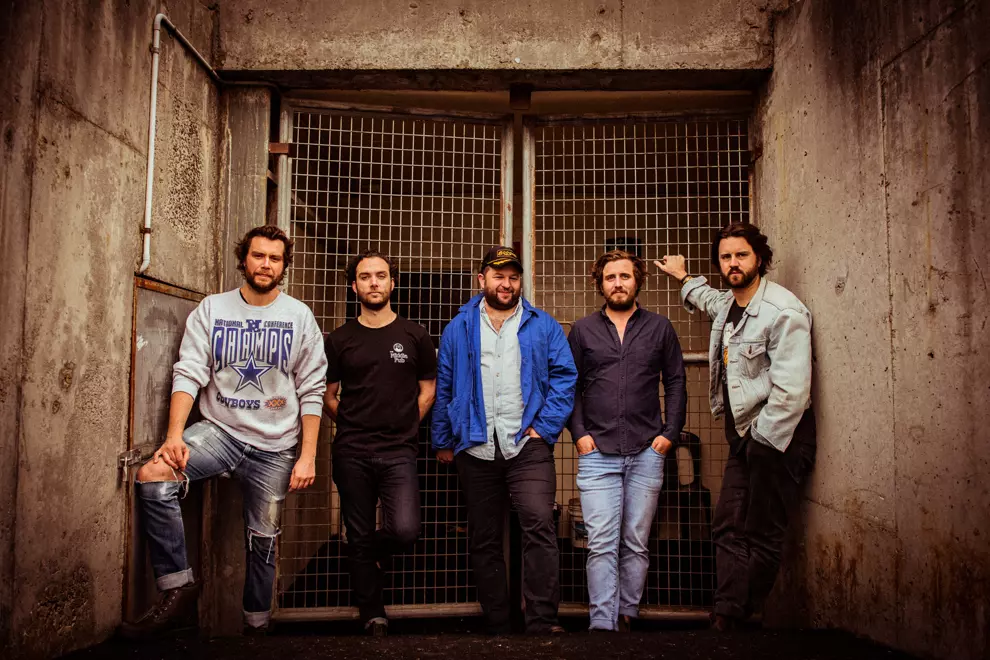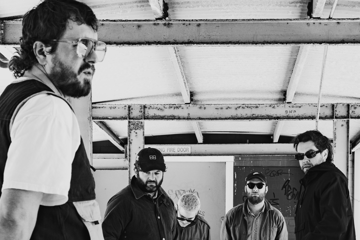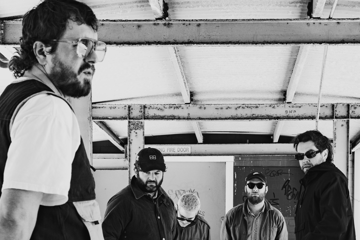 Bad//Dreems
Bad//DreemsJump on Facebook today and it won’t take you long to find a Boomer lambasting popular music, yearning for a time where bands came up through the pub-rock scene. And led by the likes of Cold Chisel, AC/DC, Hunters & Collectors and The Angels, the genre does represent an important time in Australia’s musical history. However, despite the nostalgia, the rough, mostly white, hyper-masculine scene does bring with it an element of cultural cringe for some.
This album cycle, Adelaide’s Bad//Dreems have actively tried to strip the pub-rock label from their brand. “Less pub, more sort of avant-garde art rock,” frontman Ben Marwe says. “If we can,” he laughs, “as naff as that sounds, strive for something a little bit more artistic.”
The band have never been comfortable with the denomination, guitarist (and, somewhat ironically considering the genre’s blue-collar association, plastic surgeon) Alex Cameron telling Vice back in 2017, “If people are going to judge you by an all-encompassing genre term then they can piss off."
Marwe to this day is still confused by the label, saying it might have come from the people they surrounded themselves with at the beginning of their careers. “I think that at the time because of the nature of who we surrounded ourselves with during the recording of the first two albums, with Mark Opitz and the lineage that he had with the pub-rock scene in the late ‘70s and ‘80s in Australia, people sort of wanted to place that label upon us.
Don't miss a beat with our FREE daily newsletter
“And we were probably excited that people liked [it], that there was something that we were giving them, you know what I mean? So we probably naively – I don't know if it was naively or not – adopted it, to some extent.”
However, after their first two releases, Marwe thinks “it's not really where [they’re] at anymore”. At least in in terms of where they “see the band's music and the image that [they] want portrayed”.
Acknowledging “rightly or wrongly” the “stigma” behind the genre, Marwe still celebrates the “amazing songwriting” from bands like Midnight Oil and Cold Chisel that “probably doesn't deserve that negative machismo attached to it”.
And despite producer Burke Reid telling the band to “take it out of the pub”, Marwe concedes that at the end of the day, “people will perceive it how they want to perceive it”.
“That's just how art works in general,” he says. “And that's how it should be. People should create their own opinions of art in general.”
Despite the connotations, there is no denying from Beds Are Burning to Khe Sanh, the pub genre has produced some of Australia’s most political rock. And these politicised lyrics are peppered throughout Marwe’s words too – from “Hiding in the priesthood… Pell in a tutu” in 2017’s Mob Rule, to 2019’s Piss Christ where Marwe riffs “They made arrangements to build a wall/They made arrangements to kill them all”. He suggests it’s just a reflection of the times we are living in.
"It does feel very apocalyptic. It does feel like real images of the end times."
“We find ourselves in a very bizarre time,” Marwe notes. “At times it feels, I mean, all you have to do is turn on the news and see what's happening in Hong Kong. It does feel very apocalyptic. It does feel like real images of the end times. So we're not trying to actively tell people how to think or feel. We're just merely providing lyrical content and images of what we see. I don't really find myself either side of the fence. I'm choosing to listen at this point in time, and [to] educate myself as best I can and just conduct myself – and this goes for the rest of the band too – we just want to conduct ourselves as best we can.”
Wearing their influences on their (record) sleeve, lyrically, the band also evoke a real sense of nostalgia; “I put The Triffids on the stereo,” Marwe sings in Cannonball, “No way, get fucked, fuck off!” in Salad.
“The songs do reference a lot of things culturally,” he says. “They’re punctuated by significant lines from songs that exist in that realm: The Angels, The Scientists, The Triffids. I guess that's representative of what the album sort of entails, and the ethos behind it is that, at the moment, it feels that music and art are all we really have to believe in.”






















